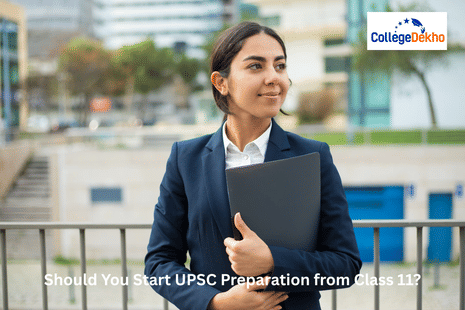Starting UPSC preparation from Class 11 helps students build a strong foundation in NCERT subjects, develop study discipline, and gain exam clarity early. With focus, discipline, and consistency, school students can begin their UPSC journey confidently.

The Civil Services Examination (CSE) conducted by the Union Public Service Commission (UPSC) is an exam that is generally recognised as one of the hardest and most prestigious of all the exams in Indian history. A huge number of aspirants apply every year and fight for a limited number of seats in services like IAS, IPS, IFS, and others. Its competitive nature leads students to often ask if it would be a good idea to start their preparations as soon as they are in Class 11.
An early start is not compulsory, but it lets the candidates get accustomed to the extensive
UPSC syllabus
slowly, acquire analytical and writing skills, and practice self-discipline in studies. Early preparation is a time-consuming process, which can lead the candidate to try different ways of working without getting tired. Nevertheless, it still has its problems that the students have to deal with wisely.
Also Check -
Why Failing UPSC Prelims Can Sometimes Guarantee Mains Glory
Advantages of Early UPSC Preparation
Preparing UPSC in school is like investing in multiple benefits in the long run, which in turn helps the students to build a solid foundation for success in UPSC .
Building a Strong Academic Foundation
If the students start early, there is a good chance for them to get a very clear understanding of subjects like History, Political Science, Economics, Geography, and Sociology. These are the subjects that take up the core of the General Studies papers in UPSC. According to Vajiram & Ravi , gaining mastery of these subjects will not only lead to success in competitive examinations but also foster skills like analytical thinking, reading comprehension, and essay writing, which are very important for mains preparation.
Developing Effective Study Habits
The early starters can also develop habits of disciplined study, learn how to manage time, and, during the process, pick up efficient study techniques. According to Ignite IAS , things become very important when one is trying to cope with the long UPSC syllabus. Being consistent over a period of time also means less stress and good retention of knowledge.
Using NCERTs for Conceptual Clarity
The NCERT texts covering Classes 6-12 are rated as the pillars of UPSC preparation. They present the content with precision, conciseness, and simple yet powerful ways of explanation. This facilitates the early learners to grasp the basics and gain confidence before venturing into advanced books.
Understanding the Exam-Oriented Perspective
The early start allows students to gradually acquire the ability to analyse and write answers, which is a necessity for answering main-level questions. Moreover, they will be able to practice reasoning, comprehension, and ethical case studies gradually, thus having an advantage over the students who start later.
Also Check -
Best Subjects to Pursue after 10th and 12th for IAS Aspirants in India
Challenges of Starting UPSC Preparation Early
While early preparation has benefits, it comes with unique challenges that aspirants must address strategically.
Juggling School and UPSC Studying
The combination of Class 11 and 12 academics with UPSC preparation can really be a challenge.
Risk of Burnout
Being totally focused on UPSC preparations at such a young age without proper breaks could lead to mental fatigue and a lot of stress. The candidates should find a good way to balance their studies, preparation, extracurriculars, and rest.
Wrong Methods and Shortcuts
At 16-17 years of age, relying on coaches’ quick ways, gaming tests, or working through mains-style questions too soon may not assist. Emphasis has to be on understanding the concepts instead of cramming or exam hacks.
Opportunity Cost
Young age commitment to UPSC may curtail the exploration of other interests or activities involving skill development. Giving up hobbies, sports, or extra-curricular activities may result in personality development change, and such a change can have long-lasting consequences.
Misleading Confidence
It is not a rule that the best person in school quizzes or mock tests will be the one to succeed in UPSC, which, in turn, will require critical thinking, analytical writing, and very good knowledge of the whole subject. Early victories could lead to a false sense of instant success, because well-prepared.
Social Pressure and Peer Comparison
The early bird gets the worm, but in the case of UPSC students, the worm may finally turn out to be societal pressure and comparing oneself with peers. It might end up causing anxiety and loss of motivation if not mastered correctly.
Psychological Stress and Loneliness
If, from the start, priority is given to UPSC preparation, the students get isolated from their friends. This social isolation can be detrimental to mental health if the students are not the ones to actively balance their social and academic lives.
Also Check -
UPSC Preparation in School or College? Which is Better?
Effective Strategies for Early UPSC Preparation
Intelligent, meticulous planning and structured strategies can help students get the best out of preparation done earlier and on the same timeline to minimise risk.
Subject Selection in Class 11
Taking Political Science, History, Geography, Economics, and Sociology, to name a few, gives a significant advantage in the process of learning material for General Studies papers. Mastering the subjects in the beginning enables the learners to be very sure of themselves when it comes to dealing with the advanced topics later.
Creating a Balanced Study Plan
It is the students' responsibility to split their time in a way that the time for school studies and UPSC preparation will be equal, thus setting a certain period for reading NCERTs, current affairs, and optional subjects. Revising regularly and setting short-term goals are ways to help keep steady movement forward without stress.
Focus on Reading and Writing Skills
In this case, developing the reading habit would be going through newspapers, editorials, and journals. It improves and expands one's knowledge of current affairs. Moreover, practicing answer writing and essay drafts comes with building articulation skills that are crucial during the mains and interview stages of the process.
Developing a Growth Mindset
The preparation conducted at an early stage must be centered on learning instead of getting high scores. Consequently, such an approach of growth-mindedness fosters curiosity, persistence, and autonomous learning.
Students often approach experienced mentors of
CollegeDekho
for strategies and career planning.
Also Check -
UPSC Mains Answer Writing Tips and Strategy 2026
If you start UPSC preparation from class 11, the benefits will be numerous, but only if one does it the right way. It gives the student enough time to build a solid conceptual framework, acquire good study habits, and get accustomed to exam-oriented thinking.
Those who start early and are wise in their planning, take advantage of NCERTs, and make good use of online resources often find themselves ahead of the competition. With discipline, consistency, and the right strategies, starting early can transform UPSC preparation from a race against time into a structured and confident path toward success.
Are you feeling lost and unsure about what career path to take after completing 12th standard?
Say goodbye to confusion and hello to a bright future!


















Similar Articles
List of Colleges Affiliated to AKTU University
TN Post Office Recruitment 2026 Apply Online: Selection Process Explained
RRB Clerk Mains Cutoff 2025-26: Expected Category-Wise Marks
Raja Mahendra Pratap University Result 2026 Released: Direct Link
SSC MTS Exam City Intimation 2026 Released: How to Check
Rajju Bhaiya University Result 2025 Update: Revaluation and Next Steps